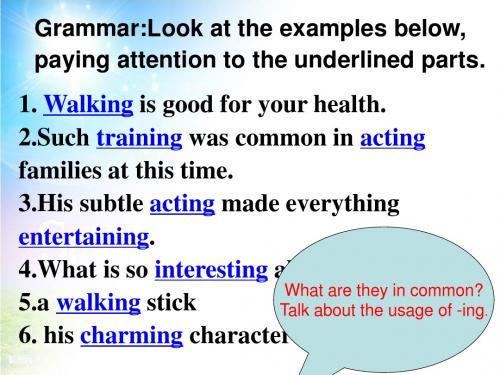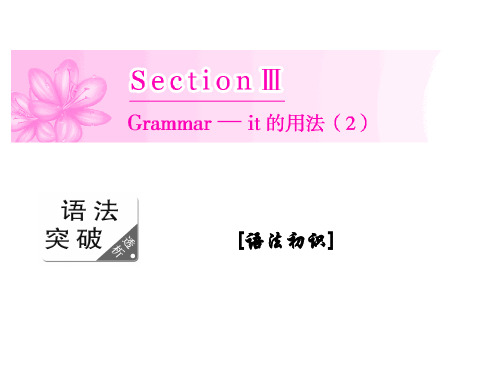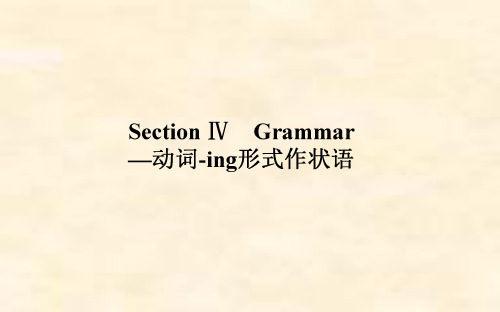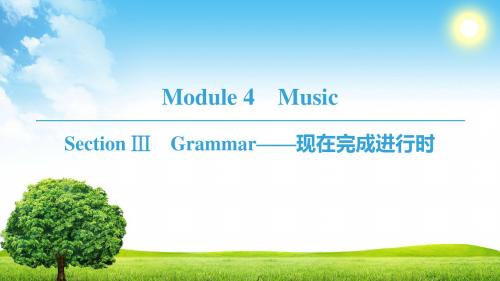18-19 Unit 4 Section Ⅲ Grammar——动词-ing形式作定语和状语
必修四 unit 3 Grammar---ing形式

1. Walking is good for your health. 2.Such training was common in acting families at this time. 3.His subtle acting made everything entertaining. 4.What is so interesting about them? What are they in common? 5.a walking stick Talk about the usage of -ing. 6. his charming character
A machine for washing an A table operating for table operating
A A sound terrifying that is sound terrifying an inspiring leader
A leader who is inspiring
I won’t have you doing that. This set me thinking. I’m sorry to have kept you waiting. I can’t get the clock going again. You won’t catch me doing that again.
Can you smell anything burning? As he spoke, he observed everybody looking at him curiously. Listen to the birds singing. I didn’t notice him waiting. 2) 表示指使意义的动词,译为“使、让” 常 见的有have, set, keep, get, catch, leave等。 如:
高中英语人教必修四:Unit3SectionⅢGrammar—动词ing形式作表语、定语和宾语补足语

即时演练 3 3-1.用所给动词的适当形式填空 ①(全国卷Ⅱ改编)They use computers to keep the
traffic running (run) smoothly.
②(辽宁高考改编)The old couple often take a walk after supper in the park with their pet dog
自主探究
(1)动词ing 形式可在句中作 表语 (句⑦)。 (2)动词ing 形式可在句中作 定语 (句②、③、⑤)。 (3)动词ing 形式可在句中作 宾语补足语 (句①、④、
⑥)。 (4)由句②和句③可以看出单个现在分词作定语时要放在
它所修饰的名词之 前 ;现在分词短语作定语时放在它所 修饰的名词之后 。
即时演练 2 2-1.用所给动词的适当形式填空
①Our school went on an organized (organize)
trip last week.
②He said if we had any questions to ask (ask),
he would help us. ③(山东高考改编)There's a note pinned to the door
following (follow) them.
3-2.完成句子
③I suddenly felt myself being hit by a heavy
fist. 我突然感到自己被重重地打了一拳。
④His question has set me thinking .
他的问题让我深思。
⑤We shouldn't keep our lights burning in the
18-19 Module 4 Section Ⅲ Grammar——时间状语从句和省略

18-19 Module 4 Section ⅢGrammar——时间状语从句和省略while 从句谓语用延续性动词表示两个延续性动作同时发生且具有对比意味,或一个动作发生在另一个动作进行的过程中as 强调主、从句动作同时发生表示“一边……一边……”之意他父亲去世时他才九岁。
Jack was working in the lab when the power cut occurred.杰克正在实验室里工作,这时突然停电了。
They arrived while we were having dinner.他们到时我们正在吃晚饭。
While I played the piano,my sister did her homework.我弹钢琴的时候姐姐在做作业。
As years go by,China is getting stronger and richer.随着时间一年一年过去,中国变得越来越富强了。
I saw my mother as I was getting off the bus.我下公共汽车的时候看见了我妈妈。
[名师点津]when在be about to do...when...,be doing...when...,had done...when...,be on one's way...when...,be on the point of doing...when...等结构中,作“正在那时”讲,表示某个动作正在发生或刚刚发生,另一动作同时发生。
He was about to leave when someone knocked at the door.他刚要离开就有人敲门。
[即时演练1]选词填空:when,while,as①It's much easier to make friends when you have similar interests.②While/When in Vienna he studied music.③You will grow wiser as you grow older.2.until,till的用法主句形式主句谓语意义肯定句用延续性动词意为“直到……为止”,表示主句中的动作到从句动作发生时结束否定句用短暂性动词意为“直到……才……”,表示主句中的动作到从句动作发生时开始He waited until she had finished speaking.他一直等到她讲完。
Unit4SectionⅢGrammar——不定式作定语和状语

英语课件
栏栏目目导导航航
②主谓关系: Women and children were the first to get into the lifeboat(登上救 生艇). ③修饰性关系:不定式前的名词是它修饰的对象,它所修饰的词 多为抽象名词。 need, time, way, right, chance, courage, reason, wish, movement... There is no need for him to come. He has no time to read the book.
Unit 4 Space Exploration
Section Ⅲ Grammar——不定式作定语和状语
英语课件
栏栏目目导导航航
突破 语法大冲关
英语课件
栏栏目目导导航航
不定式作定语和状语 不定式由“to+动词原形”构成,有时 to 可以省略,其否定形式 是“not to do”。不定式没有人称和数的变化,但有时态、语态的变化。 不定式不能作谓语,但可以作主语、宾语、状语、表语、定语和补语。 本单元主要讲述不定式作定语和状语的用法。
[提示] (1)不定式作定语需要后置。
英语课件
栏栏目目导导航航
(2)作定语的不定式与被修饰的名词或代词存在着三种主要的逻 辑关系,即被修饰的名词和代词是不定式的逻辑主语(逻辑上的主谓 关系)或逻辑宾语(逻辑上的动宾关系)或修饰性关系(同位关系)。
①动宾关系: I have a lot of work to do(要做). Give me a piece of paper to write on(写).
英语课件
栏栏目目导导航航
“ Globally , there is so much 5.________(do) . I'm hoping 6.________(go) somewhere and experience something I wouldn't get at home,”a student who intended 7.________(study) abroad said.
2018-2019学年高二英语人教版选修六课件:Unit 4 Section Ⅲ Grammar — it的用法(2)

[点津](1)强调句可以强调主语、宾语和状语,但不能强调谓语, 强调谓语动词要用“do/does/did+动词原形”。 Do be careful when you cross the street. 过马路时,务必要小心啊! (2)当被强调部分是人时,可用 that/who,其他情况都用 that。 (3)强调时间、地点、原因时不能用 when, where, why,只能用 that。
It was yesterday that John bought an old bike in a marketplace. 约翰是昨天在市场上买了辆旧自行车。(强调时间状语) It was in a marketplace that John bought an old bike yesterday. 昨天约翰是在市场上买了辆旧自行车。(强调地点状语) It is only when you have your own children that you realize the troubles of parenthood. 只有当你有了自己的孩子,才能真切地了解到为人父母的辛苦。 (强调时间状语从句)
[语法初识]
原句感知
自主探究
①There is no doubt that the earth is
becoming warmer and that it is human
activity that has caused this global
这些句子都是_强_调__句_,
warming rather than a random but
5.强调句型和定语从句的结合 句式特征为: 在强调句型的被强调部分或其他部分中找出一个先 行词,附上修饰该部分的定语从句,这样整个句子结构就变得非 常复杂。应特别注意不要混淆定语从句的关系词和强调句型中的 that/who 部分。 It was playing computer games that cost the boy plenty of time which he ought to have spent on his lessons. 是玩电脑游戏花去了这个孩子大量的应该用在功课上的时间。
20-21版:Grammar——动词-ing形式作主语和宾语(创新设计)

Yesterday being Sunday postponed the match. 昨天是星期天,比赛推迟了。(作主语) She is fond of coffee being served after dinner. 她喜欢饭后喝点咖啡。(作宾语)
14
@《创新设计》
本节内容结束
15
8
@《创新设计》
5.有些动词,后接动词-ing形式作宾语,与用动词不定式作宾语,意义大相径庭。
try to do sth尽力做某事
try doing sth
试着做某事
mean to do sth打算/意欲做某事
mean doing sth
意味着某事
forget to do sth忘记去做某事
forget doing sth
4
2.置于句末,用it作形式主语,多见于下面几个句型: It is worth doing...做……是值得的 It+be+a waste of time doing...做……是浪费时间的 It is/was no good/use doing...做……是没有好处/用处的 It is a waste of time talking about such useless things. 谈论这些没用的事情是在浪费时间。 It is no use crying over spilt milk. 覆水难收。
12
@《创新设计》
③代词宾格+动词-ing Can you imagine him/Jack cooking at home? 你能想象他/杰克在家做饭的样子吗? ④名词+动词-ing The baby was made awake by the door suddenly shutting. 这个婴儿被突然的关门声吵醒了。 [名师点津] (1)动词-ing形式的复合结构可在句中作主语或宾语。作主语时,不能用③④两种形式。 (2)无生命名词无论是作主语还是作宾语都不能用第②种形式。
2018-2019学年英语人教版选修65.4Section Ⅳ Grammar—动词-ing形式作状语

6. Having_chatted (chat) for several hours, they felt like old friends who had not seen each other for a long time. 7.(2015· 天津高考单项填空) Having_worked (work) for two days, Steve managed to finish his report on schedule. 8.He walked down the hill, singing (sing) softly to himself. 9.The volcano erupted, resulting (result) in the death of many creatures. 10. Having_been_sent (send) abroad twice, he made great progress in the field.
[ 温馨提示 ] 致。
现在分词的逻辑主语和句子的主语应保持一
(正)Hearing the news, he turned red. (误)Hearing the news, his face turned red. (his face 不能发出 hearing 这个动作) 听到这个消息,他脸红了。
语法精析 [新知导引]
难点突破区
1 . ( 教 材 P34)Having_collected(collect) and evaluated the information, I help other scientists to predict where lava from the volcano will flow next and how fast. 2 . ( 教 材 P34)Having_experienced(experience) quite a few earthquakes in Hawaii already, I didn't take much notice. 3.(教材 P34)Having earlier collected (collect) special clothes from the observatory, we put them on before we went any closer.
最新文档-Module 4 Section Ⅲ Grammar——现在完成进行时-PPT精品文档

点
拨
Hale Waihona Puke 他一天都在玩电脑游戏。I have been working for this company for three years.
我在这个公司已工作三年了。
返 首
页
(2)表示某一动作从过去开始,一直持续到说话时刚刚结束。
语
境
Sorry! I'm late.How long have you been waiting for me?
领 悟
等表示一段时间的状语连用。另外,如果表示某一动作的起点,可用 since
语
法
引导的短语或从句,如果表示某一动作的全部时间,可用 for 引导的短语。
应 用
落
语
He has been hoping for a raise in salary all the time.
实
法 精
他一直盼着加薪。
要
点 拨
精
要 的反复性。
点
拨
Have you been meeting him recently?你最近经常见到他吗?(反复性)
Have you met him recently?你最近见过他吗? 返 首 页
语
境
自
主
3.现在完成进行时有时含有某种感情色彩;现在完成时一般表示平铺直
领
悟 叙。
语 法
应
I have been waiting for you for two hours.我一直等了你两个小时。(表示
自
主
对不起!我来迟了。你等了我多长时间?
领
悟
(3)表示一直到说话时为止的一段时间内一再重复发生的动作。
语 法
- 1、下载文档前请自行甄别文档内容的完整性,平台不提供额外的编辑、内容补充、找答案等附加服务。
- 2、"仅部分预览"的文档,不可在线预览部分如存在完整性等问题,可反馈申请退款(可完整预览的文档不适用该条件!)。
- 3、如文档侵犯您的权益,请联系客服反馈,我们会尽快为您处理(人工客服工作时间:9:00-18:30)。
Section ⅢGrammar——动词-ing形式作定语和状语[语境自主领悟]一、动词-ing形式(现在分词)由“动词原形+-ing”构成,在句子中可以作主语、定语、表语、宾语补足语和状语动词-ing形式的基本形式如下:) 学生们走在街上,又说又笑。
Having worked for two days,Steve managed to finish his report on schedule.已经忙活了两天,史蒂夫设法按时完成了他的报告。
Having struggled for many years,he was finally admitted to a key university.经过多年的努力,他最终被一所重点大学录取。
Having been laughed at for his mistakes,the boy was very upset.那男孩因犯错而被嘲笑,他非常沮丧。
[名师点津]动词-ing形式的一般式常表示该动作与句子谓语动作同时发生,而动词-ing 形式的完成式则表示该动作发生在谓语动作之前。
[即时演练1]单句语法填空①I like staying up late watching (watch) TV,surfing the Internet or doing something I'm fond of.②Having lived (live) in Beijing for years,I almost know every place quite well.③Seeing (see) nobody at home,he decided to leave them a note.【导学号:21122031】二、动词-ing形式在句中作定语和状语1.动词-ing形式作定语。
The firefighters dashed into the burning woods to save people trapped in it.(前置定语)消防队员冲进了正在燃烧的丛林,去营救被困人员。
The boy standing there is a classmate of mine.(后置定语)站在那儿的那个男孩是我的一个同班同学。
The building being built over there is our library.(后置定语,强调“正在被建”)那里正在建造的大楼是我们的图书馆。
2.动词-ing形式作状语。
(1)作时间状语。
Hearing the news,he couldn't help laughing.=When he heard the news,he couldn't help laughing.一听到那个消息,他禁不住大笑起来。
(2)作原因状语。
Not knowing her address,I had better telephone her to come over.=As I don't know her address,I had better telephone her to come over.由于不知道她的地址,我还是打电话让她过来为好。
(3)作条件状语。
Working hard,you'll surely succeed.=If you work hard,you'll surely succeed.如果努力工作,你就一定会成功。
(4)作结果状语。
The child slipped and fell,hitting his head against the door.=The child slipped and fell,and hit his head against the door.那男孩滑了一跤,头撞到了门上。
[名师点津]现在分词作结果状语,是随着谓语动词的发生而产生的自然结果,而不定式作结果状语时常表示出乎意料的结果,有时前面可以加only。
I hurried to school,only to find it was Sunday.我匆忙赶到学校,结果发现是星期天。
(5)作让步状语。
Having been told many times,he still didn't learn these rules by heart.=Although he had been told many times,he still didn't learn these rules by heart.尽管被告知了很多次,他还是没把这些规定记住。
(6)作伴随状语。
Morris lay on the grass,staring at the sky for a long time.=Morris lay on the grass and stared at the sky for a long time.莫里斯躺在草地上,长时间地望着天空。
The boy sat in front of the farm-house,cutting the branches.=The boy sat in front of the farm-house,and cut the branches.那个男孩坐在农舍前砍树枝。
(7)作方式状语。
He came running back to tell me the news.他跑回来告诉我这个消息。
[名师点津]动词-ing形式作状语时,相当于与之对应的状语从句,但是当作伴随状语及结果状语时,可转化为并列谓语。
[即时演练2]句型转换(用非谓语动词变换句子)①It rained heavily and it caused great damage.→It rained heavily,causing great damage.②After he had eaten his dinner,the boy rushed out.→Having eaten his dinner,the boy rushed out.③All night long he lay awake and he thought of the problem.【导学号:21122032】→All night long he lay awake,thinking of the problem.三、现在分词作状语注意事项1.现在分词的时态现在分词作状语时,要注意分词的时间性,是用现在分词的一般式(doing),还是用完成式(having done)。
(1)当现在分词的动作与谓语动词的动作同时发生时,用分词的一般式。
Walking in the street,I met an old friend of mine.我正在大街上行走时,遇到了一位老朋友。
(walking和谓语动词met同时发生)(2)当现在分词的动作先发生,而谓语动词的动作后发生时,用分词的完成式。
Having finished the letter,he went to post it.他写完信后就把它寄了出去。
(having finished是先发生的,went是后发生的) 2.现在分词的语态使用现在分词的主动式还是被动式,这主要取决于现在分词和句子主语之间的关系。
句子的主语就是分词的逻辑主语。
Having been shown around the factory,they were very happy.(现在分词的被动式)被领着参观了工厂后,他们很高兴。
Having finished his homework,he went to bed.(现在分词的主动式)完成了作业后,他上床睡觉。
3.动词-ing形式的否定式:not+v.-ing;not having+v.-edNot knowing this,he didn't come.他不知道这件事,所以没来。
Not having made full preparations,we put off the sports meeting.因为没有做好充分的准备,我们把运动会延期了。
4.现在分词作评注性状语有些现在分词在句中没有逻辑主语,它们往往作为句子的评注性状语来修饰整个句子,表明说话者的态度、观点等。
例如:generally speaking“一般来说”,judging by/from ...“从……判断”,taking everything into consideration“从全盘考虑”。
Judging from his behaviour,he must be mad.从他的行为来判断,他一定是疯了。
[即时演练3]单句语法填空①Having worked (work) for three hours,he took a rest.②Tom came dashing (dash) into the room with some film tickets in his hand.③Having spent (spend) all his money,the boy had to give his mother a call.[语法应用落实]Ⅰ.单句语法填空1.He often carefully watched the doctors in the operating (operate) room.2.Seen (see) from the tower,the city looks very beautiful.3.Those students hoping (hope) to enter that university should work really hard.4.Working (work) harder at English,you'll make greater progress.5.To finish (finish) the work ahead of time,we have to work hard.6.Do you remember the name of the girl sitting (sit) next to you in the old photo?7.Tom received a phone call from his mother saying (say) that she would visit him this weekend.8.The boy wearing (wear) a sad look said,“I can't find my parents.”【导学号:21122033】9.Leaving (leave) some questions unanswered,my friend said goodbye to me.10.When you meet people from different cultures,it is important to understand (understand) what you can and cannot do.11.The children rushed out of the classroom,talking (talk) about something happily.12.With the rapid development of China,the number of foreigners learning (learn) Chinese is growing all the time.13.Not realizing (realize) that he had hurt Shirley,Jordan continued to shout at her.14.Hearing (hear) the signal,people ran out of the building.15.Having selected (select) the proper present,they sent it to their respectable professor.Ⅱ.完成句子1.因粗鲁行为而向老师道歉后,他许诺以后将不再犯同样的错误。
